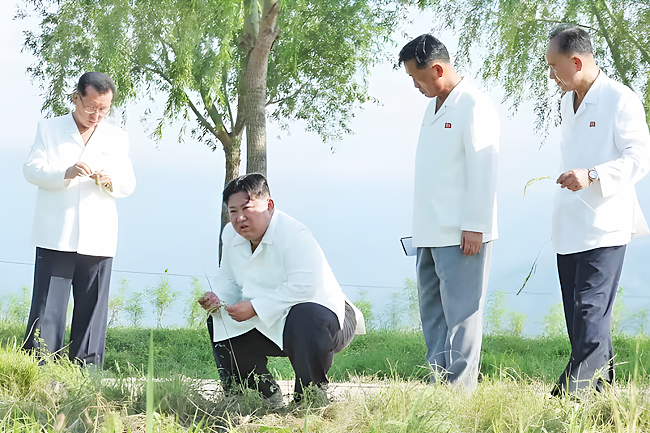SEOUL (AFP) – North Korean leader Kim Jong-un visited typhoon-hit farms and oversaw military helicopters spraying pesticides in a bid to salvage key crops, state media said yesterday.
Tropical Storm Khanun made landfall last week in the North, a country where natural disasters can be devastating due to weak infrastructure and widespread deforestation, which increases vulnerability to flooding.
The visit came hours after the United Nations Security Council accused the North Korean regime of spending heavily on its nuclear arms programme while its people go hungry and lack basic necessities. On Thursday, South Korea’s spy agency told lawmakers that around 240 North Koreans had starved to death between January and July this year, Member of Parliament Yoo Sang-bum told reporters after the briefing.
Kim visited rice paddy fields in Kangwon province that had been flooded by the typhoon, but predicted a “complete recovery from the damage” thanks to the patriotism of soldiers who helped salvage the crop, the Korean Central News Agency (KCNA) reported.
KCNA images showed Kim, in a white jacket and trousers, squatting at the edge of the paddy field while military helicopters sprayed crops.

The North Korean leader said the rapid response of the military to the typhoon damage had been “performing a miracle of recovering flooded farmland in a brief span of time”.
But some experts questioned how effective the measures would be.
“Kim Jong-un’s order to mobilise air force planes is merely a show,” defector-turned-researcher An Chan-il, who runs the World Institute for North Korea Studies, told AFP.
“The appropriate time for pesticide spraying on crops has already passed,” he said, adding that reliance on the military for typhoon damage recovery showed other available resources may be depleted.
On Thursday, Seoul’s spy agency said people were starving in the North, with the country’s economy trapped in a “vicious cycle” with negative growth for three years from 2020 to 2022. The North’s domestic product experienced a significant drop of 12 per cent in 2022 compared to 2016, the agency told lawmakers during a briefing, according to lawmaker Yoo.
The number of North Koreans said to have died due to hunger between January to July was more than double the recent annual average of 110.
The North has periodically been hit by famine, with hundreds of thousands of people dying – estimates range into the millions – in the mid-1990s.




